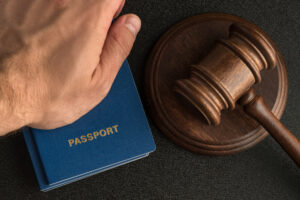Legal Implications for Immigrant Families in DCP&P Cases
New Jersey DCPP May Investigate Immigrant Families, and Some Protections Exist, But Deportation is Still a Possibility Depending on the Circumstances
 Living in a country different from your own is challenging. Adapting to the culture, food, and customs can pose significant hurdles. Additionally, immigrant families have different issues regarding DCP&P investigations. Many families come from countries where government involvement in a family’s private life is rare, and they distrust child welfare agents. Others aren’t able to answer basic questions about the health and safety of their children due to a language barrier.
Living in a country different from your own is challenging. Adapting to the culture, food, and customs can pose significant hurdles. Additionally, immigrant families have different issues regarding DCP&P investigations. Many families come from countries where government involvement in a family’s private life is rare, and they distrust child welfare agents. Others aren’t able to answer basic questions about the health and safety of their children due to a language barrier.
New Jersey’s Department of Children and Families prioritizes children’s health, safety, and happiness, with special consideration for families with unauthorized family members. DCP&P cannot report unauthorized family members to the federal government. State employees are prohibited from disclosing immigration information to federal immigration authorities for the purpose of immigration law enforcement.
DCP&P investigations are based on civil, not on criminal law. Their investigations and reports stay within their agency unless and until they observe or suspect criminal child abuse and neglect. When a crime has allegedly been committed, they are obligated to involve the authorities. Unauthorized and authorized immigrants are at risk for deportation as a result of the charges pressed against them.
Crimes and Deportation for Immigrant Parents
Documented or undocumented parents can be deported for crimes involving violence, dishonesty, sex crimes, or those in relation to the welfare of a child, as in the cases of abuse and neglect. Drug-related crimes, firearm offenses, DUI or DWI where there was grave injury or death, and human trafficking are examples of crimes that involve “moral turpitude.” They are a part of the Immigration and Nationality Act. The court identifies crimes against children as those of moral turpitude. When a DCP&P investigation leads to this kind of crime, an immigrant can be deported when they are convicted of a crime within five years of being admitted to the U.S. and receive a sentence of at least one year in prison, or they are convicted of committing two unrelated crimes.
What is True About Immigration Inquiries and DCP&P Policies
DCP&P employees cannot ask about the parents’ immigration situation. Failure to adhere to this policy can indicate bias on the part of the agent. It is against the law for them to threaten the parents with deportation or that they will notify immigration authorities if cooperation is not received.
Legal Protections for Immigrant Families in DCP&P Inquiries
As with U.S. citizens, authorized or unauthorized immigrants are not obligated to talk with a DCP&P investigator. They have the right to refuse entry to their homes, refuse a drug or alcohol test, or refuse to receive a physical or mental evaluation. Parents have a right to refuse to sign a release granting DCP&P access to their child’s medical and educational information. They have the right to communicate with their children during the DCP&P investigation, know the accusations against them, and have the right to legal counsel.
Cooperating with a DCP&P investigation is usually the best way to a prompt resolution, but if you feel your rights are being violated, it is best to hire an attorney who can protect your family’s rights.
Distinguishing Between DCP&P Matters and Criminal Matters for Non-Citizens in New Jersey
A DCP&P case is not a criminal matter on its own. It is an investigation into the safety and health of a child. There are many reasons a case can be opened, whether from an anonymous tip on the hotline to a concerned neighbor or a mandatory reporter such as a teacher or counselor. The purpose of a DCP&P investigation is to determine if the allegations have merit, focusing exclusively on the welfare of the child. It is a civil matter in Family Court.

Child Custody Options After Parental Deportation
If an immigrant parent is removed from the U.S. because of their criminal record, but their child has U.S. citizenship, the child can stay in the country. If their parent is deported, it is possible for the parent to assign custody to a family member or legal guardian, thereby circumventing the foster care system. Both parents must ratify the custody agreement, and if they disagree, a hearing will have to be held to determine what is best for the child.
Child Abuse and Neglect Defense Lawyers Helping Immigrant Parents with Criminal and DCP&P Cases in New Jersey
Criminal allegations involving child abuse and neglect and DCP&P investigations are complex matters that require experienced knowledge of criminal and family law in New Jersey. You shouldn’t be afraid that a DCP&P investigation will result in your deportation. If you want to protect your rights and what is best for your family, our child protection and permanency defense attorneys can help you. Our attorneys are aware of the unique challenges a case like this can present in Morristown, Middletown, Holmdel, Ridgefield Park, Wayne, Clifton, Union, and other towns across the entirety of New Jersey. We will work with you to map out a plan of action. If you are undocumented or documented and are dealing with a DCP&P investigation, our legal team is prepared to defend your case in criminal and family courts. Reach out to us now at (908)-356-6900 for a complimentary and confidential discussion regarding your situation.
